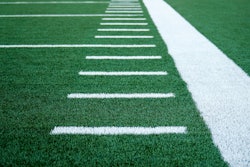
A federal lawsuit filed this week alleges that the Ivy League’s policy of not offering athletic scholarships amounts to a price-fixing agreement that denies athletes proper financial aid and payment for their services.
As reported by The Associated Press, the lawsuit was filed Tuesday in U.S. District Court in Connecticut by attorneys representing Grace Kirk, a member of Brown's women’s team, and Tamenang Choh, who played for the men's team from 2017 through 2022. They are seeking class-action status to represent all athletes recruited by the eight Ivy League schools since March 2019.
The suit argues Ivy League schools illegally conspired to limit financial aid and not compensate athletes for their services.
“In either case, regardless of whether considered as a restraint on the price of education, the value of financial aid, the price of athletic services, or the level of compensation to Ivy League athletes, the Ivy League Agreement is per se illegal," the lawsuit states, as reported by the AP's Pat Eaton-Robb.
Harvard, Yale, Brown, Princeton, Dartmouth, Cornell, Columbia and Penn don’t offer merit scholarships of any kind, including athletic scholarships — a policy established in 1954. The Ivy League remains the only Division I athletic conference that prohibits member schools from offering any athletic scholarships.
“The Ivy League athletics model is built upon the foundational principle that student-athletes should be representative of the wider student body, including the opportunity to receive need-based financial aid,” league executive director Robin Harris said in a statement responding to the lawsuit. “In turn, choosing and embracing that principle then provides each Ivy League student-athlete a journey that balances a world-class academic experience with the opportunity to compete in Division I athletics and ultimately paves a path for lifelong success.”
Attorneys for the Brown athletes point out that other elite academic schools, such as Stanford and Duke, offer athletic scholarships, Eaton-Robb wrote.
“These schools are not part of the Ivy League, but they demonstrate they can maintain stellar academic standards while competing for excellent athletes, and without agreed upon limits on price,” the lawsuit said.
As reported by Eaton-Robb, the suit also argues that Ivy League schools have a major influence over the path that a small pool of people who are both elite students and elite athletes can take, so by not offering athletic scholarships, the league is artificially suppressing the market for those students.
“The natural, foreseeable, and intended result of the Ivy League Agreement is that Ivy League athletes have paid more for their education and earned less in compensation or reimbursement than they would have in the absence of the agreement,” the lawsuit said.





































